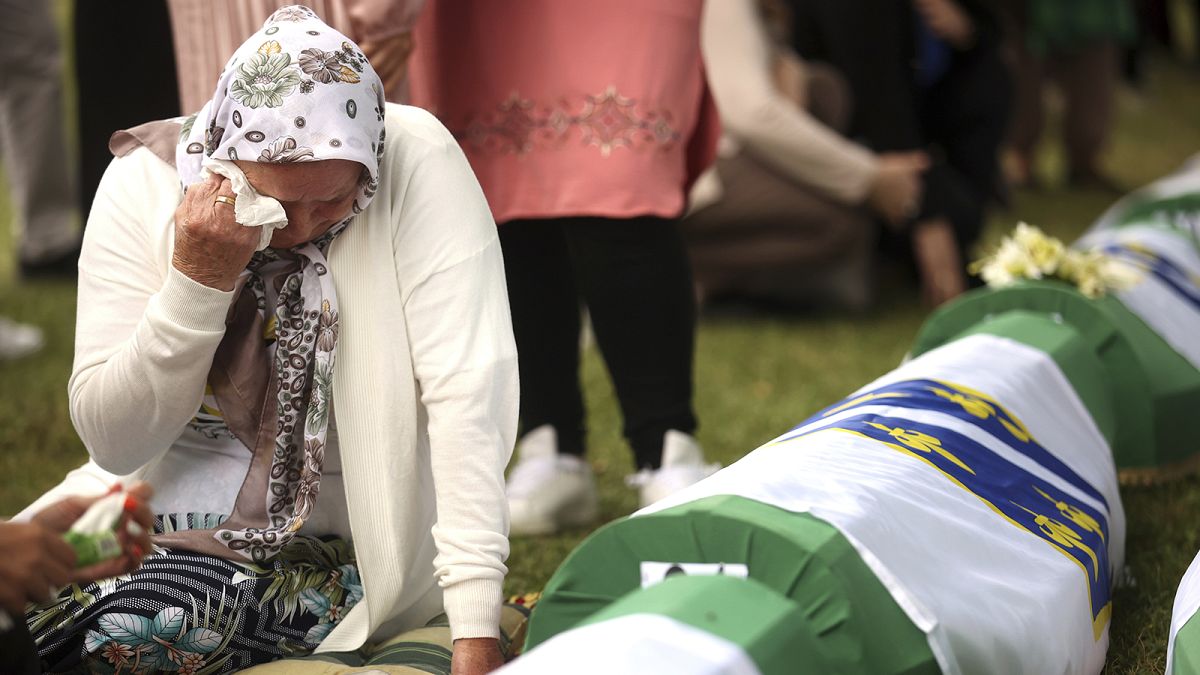The three-day mass execution of more than 8,000 Bosniak men and boys is Europe's only genocide since the Holocaust.
Fifty newly identified victims were honoured and interred on Monday in Bosnia as thousands gathered to commemorate the anniversary of the 1995 Srebrenica massacre -- Europe's only genocide since the Holocaust.
The remains of 47 men and three teenage boys were laid to rest at a memorial cemetery on the outskirts of Srebrenica, 27 years after they were murdered. They join more than 6,600 other massacre victims already interred there.
Idriz Mustafić attended the collective funeral to bury the partial remains of his son, Salim. He was 16 when he was killed in Srebrenica in July 1995 while trying to flee the town as it was overrun by Bosnian Serb forces in the closing months of Bosnia's 1992-95 war.
"My older son, Enis, was also killed. We buried him in 2005. Now I am burying Salim," Mustafić said.
"[Forensic experts] have not found his skull. My wife got cancer and had to undergo surgery, we just couldn't wait any longer to bury the bones that we found, to at least know where their graves are," he added.
'It's easier when you have a grave to visit'
The Srebrenica killings were the bloody crescendo of Bosnia's war, which was the result of the breakup of Yugoslavia unleashing nationalistic passions and territorial ambitions that set the three main ethnic groups in the country -- Bosniaks, Serbs and Croats -- against each other.
In July 1995, Bosnian Serb forces overran the United Nations-protected safe area of Srebrenica, at the time almost exclusively populated by Bosniaks from the city and neighbouring villages who sought refuge there.
The Army of the Republika Srpska (VRS) troops separated at least 8,000 Bosniak men and boys from their wives, mothers and sisters, summarily executing them on-site or in neighbouring towns over the course of three days.
Some who tried to escape were chased through woods around the town, rounded up and murdered.
The perpetrators then ploughed their victims' bodies into hastily made mass graves. Some of those were later dug up with bulldozers, scattering the remains among other burial sites to hide the evidence of their war crimes.
During the process, the half-decomposed remains were ripped apart. Body parts, sometimes as small as a finger bone, are still being found in mass graves around Srebrenica -- but also in other areas of the country -- and are being put together and identified through painstaking DNA analysis.
When the remains are identified, they are returned to their relatives and reburied in the memorial centre and cemetery just outside Srebrenica each 11 July — the anniversary of the day the killings began in 1995.
Mana Ademović, who lost her husband and many other male relatives in the massacre, was among those attending Monday's commemoration ceremonies in Srebrenica. Ademović found her husband's partial remains and reburied him years ago but said she "must be in Srebrenica every 11 July".
"It is easier when you have a grave to visit, no matter how many bones are buried inside," she said while sitting among the graves at the vast and still-expanding memorial cemetery, hugging her husband's white marble headstone.
Dutch diplomat apologises over UN peacekeepers' role
In the last two years, due to the COVID-19 pandemic, only a relatively small number of survivors were allowed to attend the annual commemoration service and collective funeral of the victims in Srebrenica. But with restrictions lifted, tens of thousands attended Monday, including many diplomats and dignitaries.
Addressing the commemoration ceremony ahead of the funeral, the Dutch Defence Minister Kajsa Ollongren apologized to the Srebrenica survivors for the Dutch UN peacekeepers' failure to prevent the 1995 massacre.
"The international community failed to offer adequate protection to the people of Srebrenica and, as part of that community, the Dutch government shares responsibility for the situation in which that failure occurred and for this we offer our deepest apologies," Ollongren said.
The Dutch peacekeepers' battalion, or Dutchbat, was tasked by the UN to protect the civilians within the Srebrenica safe area.
However, due to a lack of coordination with the UNPROFOR leadership and fear of entering into an open conflict with the Bosnian Serb forces, the peacekeepers allowed the VRS to commit the crimes in July 1995.
The Srebrenica killings were the only event of the Bosnian war to be legally defined as genocide. The war itself left over 100,000 dead.
'Momentous significance for all who have a conscience'
Since the end of the war, the UN's International Criminal Tribunal for the former Yugoslavia in The Hague and courts in the Balkans have sentenced close to 50 Bosnian Serb wartime officials — including their wartime leader Radovan Karadžić and his military commander, Ratko Mladić — to more than 700 years in prison for the Srebrenica killings.
At the ICTY, both Karadžić and Mladić received maximum sentences of life in prison for genocide and other war crimes.
However, despite the irrefutable evidence of what happened collected by international UN-led teams and domestic experts alike, most Serb leaders in Bosnia and neighbouring Serbia continue to downplay or even deny the Srebrenica massacre and celebrate Karadžić and Mladić as heroes.
Menachem Rosensaft, the general counsel of the World Jewish Congress, also addressed the mourners Monday.
He said the commemoration of the Srebrenica genocide was of "momentous significance for all who care about international human rights, for all who have a conscience."
Rosensaft said it was "critical" for the international community to formally commemorate the Srebrenica genocide every 11 July "not just out of respect for its victims, but as a public countermeasure to the repeated efforts to deny this genocide."
